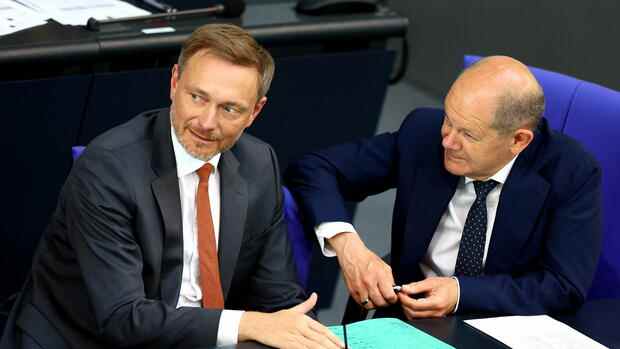According to information from the Handelsblatt, the finance minister strictly rejects a renewed suspension of the debt brake.
(Photo: Reuters)
Berlin Confusion about the debt brake: According to a report by “Welt am Sonntag”, Chancellor Olaf Scholz plans to suspend the instrument in 2023 as well.
But the news hadn’t been public for five minutes when Federal Finance Minister Christian Lindner (FDP) spoke up on Twitter – and denied it.
“Misleading message. It is about the long-known demand of the countries for an emergency resolution so that they can take out more loans. This is not about the federal budget for 2023. However, it has not been decided whether this decision is necessary and will come,” wrote the FDP chairman.
What happened? According to the report, Chancellor Olaf Scholz (SPD) wants to suspend the debt brake in the coming financial year. According to the report, Lower Saxony’s Prime Minister Stephan Weil (SPD) announced this at a meeting of the Prime Ministers’ Conference (MPK) in Hanover. According to several participants, the current MPK chairman Weil informed his colleagues about a conversation he had with Scholz about it.
Top jobs of the day
Find the best jobs now and
be notified by email.
He said: “Firstly, the Federal Chancellor expressed that he was aware that the federal states would also have to resort to credit funds to cover the tasks that were now pending. And secondly, he assumes that the federal and state governments will jointly determine that the factual prerequisites for an extraordinary emergency situation exist.
Debt brake: is there an emergency situation?
This second point is crucial. Because the Basic Law defines an emergency situation as a mandatory prerequisite for suspending the debt brake. If there is no emergency situation, the debt brake continues to apply.
Just today, the Bundestag lifted the debt brake for 2022 a second time with the majority of the traffic light coalition. The federal government can now take on up to 200 billion euros in new debt in order to mitigate the consequences of the Ukraine war – for example via the energy price brake. In the application, the Russian attack on Ukraine was explicitly named as an emergency situation.
>> Read also: “Double booms” possibly unconstitutional
However, the report is about the coming budget year 2023: Shortly after publication, the Handelsblatt learned from those close to the Federal Minister of Finance that a suspension of the debt brake in the federal government would also result in a serious coalition crisis next year. Compliance in the coming fiscal year is non-negotiable.
In Germany, the debt brake applies to both the federal and state governments. The only difference is that according to the regulation, the federal states are not allowed to take on any new debt, while the federal government can still take on up to 0.35 percent of GDP in new debt. Apparently, the federal states should now be allowed to deviate from this requirement.
According to information from the Handelsblatt from coalition circles, the tax estimate should first be awaited, the results of which will be published next week. The figures for the federal states could turn out to be very positive here, it is said. In addition, an economic slump comparable to Corona is not yet apparent. With the 200 billion euro defense shield, there is the necessary help anyway.
New dispute over debt brake is imminent
But the alleged announcement by Scholz should also fuel the debate about the debt brake in the federal government. The Union rejected the suspension for 2022 on Friday. Group Vice Mathias Middelberg criticized that so far there is neither a concept for the gas price brake nor for the electricity price brake.
“Today the decision is that you want us to give you a money bag filled with 200 billion euros, which you then want to put in your government’s basement and then you want to think about what to do with it,” he said. “No one in this country knows what you’re doing specifically.”
So far, the proposals of the expert commission on the gas price brake are still being evaluated by the federal government. According to their calculations, they should cost a good 90 billion euros. However, there are already calls from the coalition parties to expand the support measures.
More: IMF deputy head fears longer crisis – “Germany will feel the shocks particularly”
